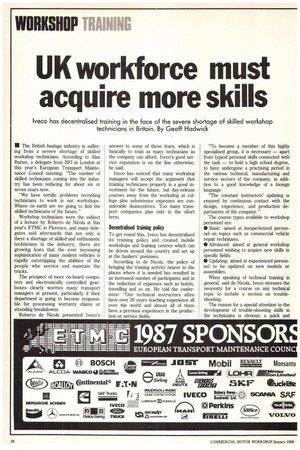UK workforce must acquire more skills
Page 88

If you've noticed an error in this article please click here to report it so we can fix it.
Iveco has decentralised training in the face of the severe shortage of skilled workshop technicians in Britain. By Geoff Hadwick
• The British haulage industry is suffering from a severe shortage of skilled workshop technicians. According to Alan Barter, a delegate from BFI in London at this year's European Transport Maintenance Council meeting: "The number of skilled technicians coming into the industry has been reducing for about six or seven years now.
"We have terrific problems recruiting technicians to work in our workshops. Where on earth are we going to find the skilled technicians of the future."
Workshop technicians were the subject of a lecture by Roberto de Nicola at this year's ETMC in Florence, and many delegates said afterwards that not only is there a shortage of skilled and enthusiastic technicians in the industry, there are growing fears that the ever increasing sophistication of many modern vehicles is rapidly outstripping the abilities of the people who service and maintain the trucks.
The prospect of more on-board computers and electronically controlled gearboxes clearly worries many transport managers at present, particularly if their department is going to become responsible for processing warranty claims or attending breakdowns.
Roberto de Nicola presented Iveco's answer to some of these fears, which is basically to train as many technicians as the company can afford. Iveco's good service reputation is on the line otherwise, he said.
Iveco has noticed that many workshop managers will accept the argument that training technicians properly is a good investment for the future, but day-release courses away from the workshop at college plus subsistence expenses are considerable disincentives. Too many transport companies plan only in the short term.
Decentraked training policy
To get round this, Iveco has decentralised its training policy and created mobile workshops and training centres which can be driven around the country and set up at the hauliers' premises.
According to de Nicola, the policy of bringing the training activity nearer to the places where it is needed has resulted in an increased number of participants and in the reduction of expenses such as hotels, travelling and so on. He told the conference: "Our technical instructors often have over 20 years teaching experience all over the world and almost all of them have a previous experience in the production or service fieLds. "To become a member of this highly specialised group, it is necessary — apart from typical personal skills connected with the task — to hold a high school degree, to have undergone a practising period in the various technical, manufacturing and service sectors of the company, in addition to a good knowledge of a foreign language.
"The constant instructors' updating is ensured by continuous contact with the design, experience, and production departments of the company."
The course types available to workshop personnel are: • Basic: aimed at inexperienced personnel on topics such as commercial vehicle repair techniques.
• Advanced: aimed at general workshop personnel wishing to acquire new skills in specific fields.
• Updating aimed at experienced personnel to be updated on new models or assemblies.
When speaking of technical training in general, said de Nicola, Iveco stresses the necessity for a course on any technical topic to include a section on troubleshooting.
The reason for a special attention to the development of trouble-shooting skills in the technicians is obvious: a quick and








































































































